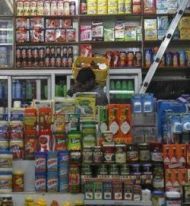 After two dull years in a row, the year 2015 could see a steady increase in outbound deals in the fast-moving consumer goods (FMCG) space, given that most top companies in the sector are sitting on huge cash reserves.
After two dull years in a row, the year 2015 could see a steady increase in outbound deals in the fast-moving consumer goods (FMCG) space, given that most top companies in the sector are sitting on huge cash reserves.
Deals already seem to have started flowing, with Godrej Consumer Products acquiring South Africa’s Frika Hair for an estimated Rs 75-80 crore earlier this week. T
his was the company’s fifth acquisition in Africa since it entered the continent nine years ago. The previous ones included those of Darling Group in June 2011 and a small acquisition in Chile the next year.
It also took over a top-up in the UK in January 2013. The year 2012 was one of the most active ones in terms of outbound FMCG deals, with Wipro buying into LD Waxon in Singapore and VLCC acquiring Malaysia’s Wynn International, among key transactions.
The previous year had been one of the most active in terms of inbound deals, with Reckitt Benckiser completing the acquisition of Ahmedabad-based Paras Pharmaceuticals and Jyothy Laboratories buying into Henkel India.
The biggest inbound deal, though, came in 2013-14, when Unilever spent $5.4 billion for a 23 per cent stake in Hindustan Unilever.
According to advisory firm Grant Thorton, the total value of FMCG deals rose from $47.94 million in 2009 to $947.43 million in 2010, and fell to $366.85 million in 2011.
The result: Companies’ cash reserves showed a marked rise.
The listed FMCG companies in India were sitting on a combined cash reserve of more than Rs 52,000 crore as of the end of 2013-14.
Companies, primarily the home-grown majors active in the deal market, are looking for acquisition opportunities.
The total reserves of Godrej Consumer Products, which has, over a decade, acquired 13 assets, eight of those between 2010 and 2012, have seen a four-fold jump — to Rs 2,990.32 crore in 2013-14 from Rs 796.65 crore in 2009-10.
Godrej Consumer Chairman Adi Godrej has on several occasions spoken about acquisitions’ importance for his company.

“We remain committed to our three-by-three strategy: Finding good assets in Asia, Africa and Latin America in the areas of personal wash, hair colour and household insecticides.”
Dabur India, on a lookout for possible acquisition targets in India and abroad, had bought Turkey-based Hobi Kozmetik in 2010 and US-based Namaste Group in 2011.
It has seen its total reserves swell by close to three times — from Rs 662 crore in 2009-10 to Rs 1,727.96 crore in 2013-14. Dabur Chief Executive Officer Sunil Duggal says acquisitions continue to be on his company’s radar.
Dabur, too, had been in the race for Paras Pharma. The company has since made no significant buys in the FMCG space. Marico Chairman Harsh Mariwala, too, has indicated his company is not averse to acquisitions.
And, if the fit is right, the firm could consider acquisitions in its area of operation.It last acquired the personal care brands of the erstwhile Paras Pharma from Reckitt Benckiser in May 2012 for Rs 500 crore.
Marico’s total reserves jumped to about four times between 2009-10 and 2013-14 — from Rs 510.73 crore to Rs 1,908.85 crore.
Kolkata-based Emami Group went for a few acquisitions in 2014; it last bought She brand of sanitary ware, and the edible oil brand Rasoi. Its director, Aditya Agarwal, says the company continues to scout for acquisitions in the personal and healthcare segments.
“There is renewed optimism in the market. Companies are again looking at growth.
When that happens, M&A (merger & acquisition) activity picks up, given that inorganic growth is quicker to show than organic
. Renewed optimism will mean there will be buyers in the market, and not just sellers.
The past 12-18 months saw only sellers, no buyers. The next 12 months will see at least some buyers, and distressed assets could be sold, albeit at realistic prices.
In the past three-four years, valuation expectations had soared.
I see those at realistic levels now,” says Technopak Chairman Arvind Singhal. Naveen Kulkarni, co-head (research), Phillip Capital, however, believes acquisitions abroad might not make much sense now, as growth in domestic market is visible.
“I say this because the (FMCG) market is slated to pick up by the end of this financial year. It makes sense to partake of growth here rather than elsewhere,” he says.
Pinaki Ranjan Mishra, patner & national leader (consumer & retail), Ernst & Young, says there there will be outbound deals “but I see inbound deals as a bigger trend”.
Many of these companies are debt-free. Hindustan Unilever, Emami, Gillette India, P&G India, Colgate Palmolive and GSK reported zero debt at the end of 2013-14.
Marico reduced its net debt to Rs 273.39 crore from Rs 652.70 crore the previous year and Rs 334.42 crore in 2009-10.
Dabur’s net debt dropped to Rs 188.76 crore in 2013-14 from Rs 770.55 crore in 2010-11. Godrej Consumer’s net debt declined to Rs 1,668.05 crore in 2013-14 from Rs 1,773.84 crore in 2009-10.











